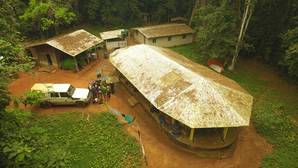NEW paper alert in NATURE HUMAN BEHAVIOUR: Evidence of organized but not disorganized attachment in wild Western chimpanzee offspring (Pan troglodytes verus)
- taichimpanzeeproje
- May 23, 2025
- 1 min read
Have you ever wondered how your childhood relationship with your parents shaped the person you are today? Scientists have long known that early attachment to caregivers plays a crucial role in human development, but what about one of our closest relatives, the chimpanzee?

By observing the behaviour of wild chimpanzees in Taï National Park, Côte d'Ivoire, over four years, researchers discovered that young chimpanzees, like human children, develop different types of attachment to their mothers. Some feel secure, relying on their mother in times of distress and exploring their environment confidently, knowing she is there to support them. Others have insecure-avoidant attachment, which means they tend to be more independent and do not seek comfort from their mothers as much. However, unlike humans, where 23.5 percent of children show disorganised attachment, and captive orphaned chimpanzees, where 61 percent show this type of attachment, wild chimpanzees showed no signs of disorganised attachment.
Mother-offspring attachment in the wild: Wild chimpanzees develop secure or insecure-avoidant attachments to their mothers, but not disorganised attachments, suggesting that it is not a viable survival strategy in the wild.
Attachment types: Chimpanzees with secure attachment are confident, while those with insecure-avoidant attachment are more independent. Disorganised attachment, common in humans and captive chimps, is linked to emotional and mental health issues.
Potential parenting lessons: Taking into account the impact of the caregiving environment on attachment types and how early life experiences shape social and emotional development may lead to more effective parenting strategies.




Comments